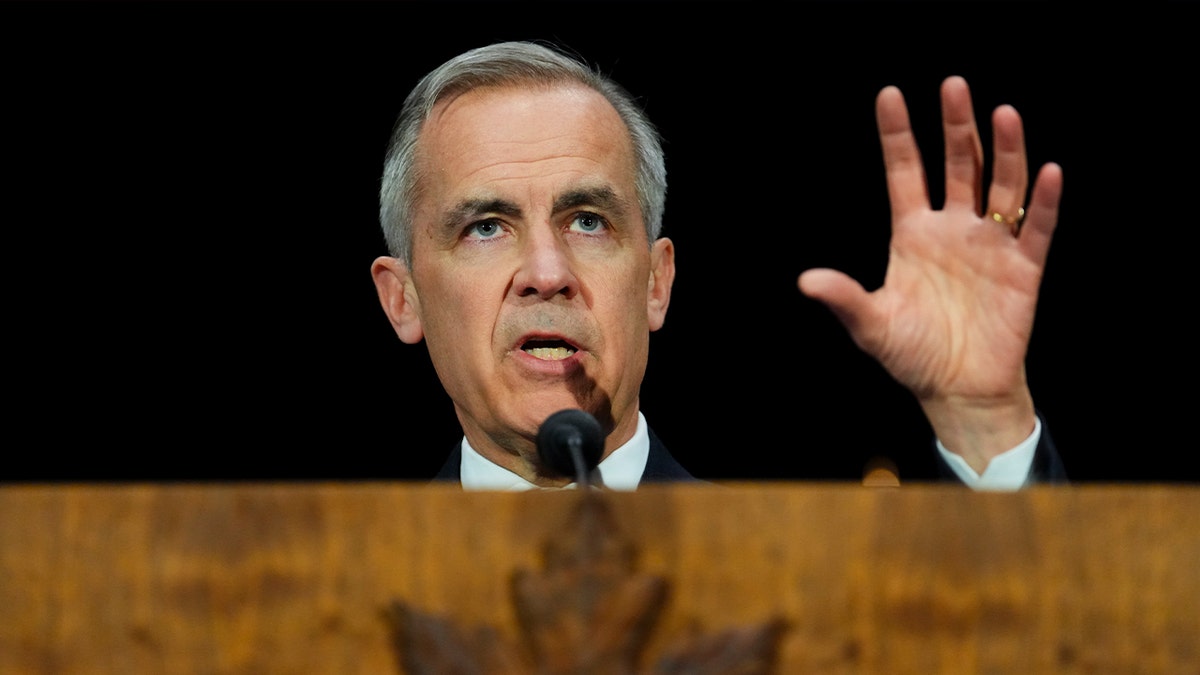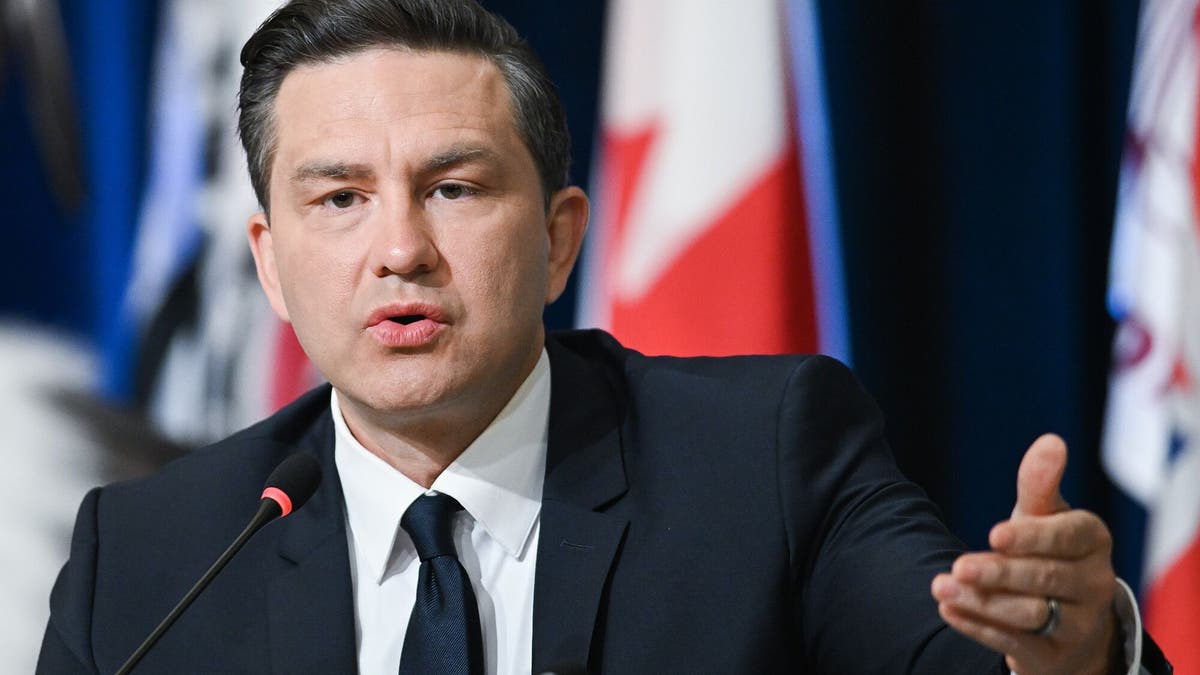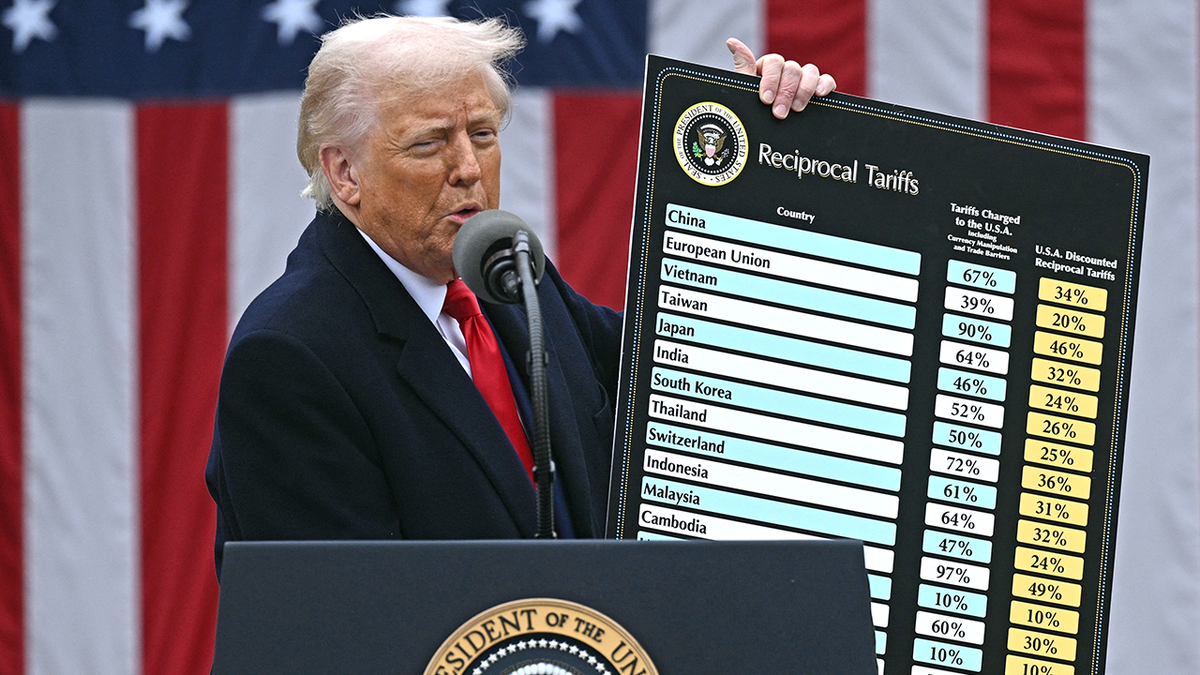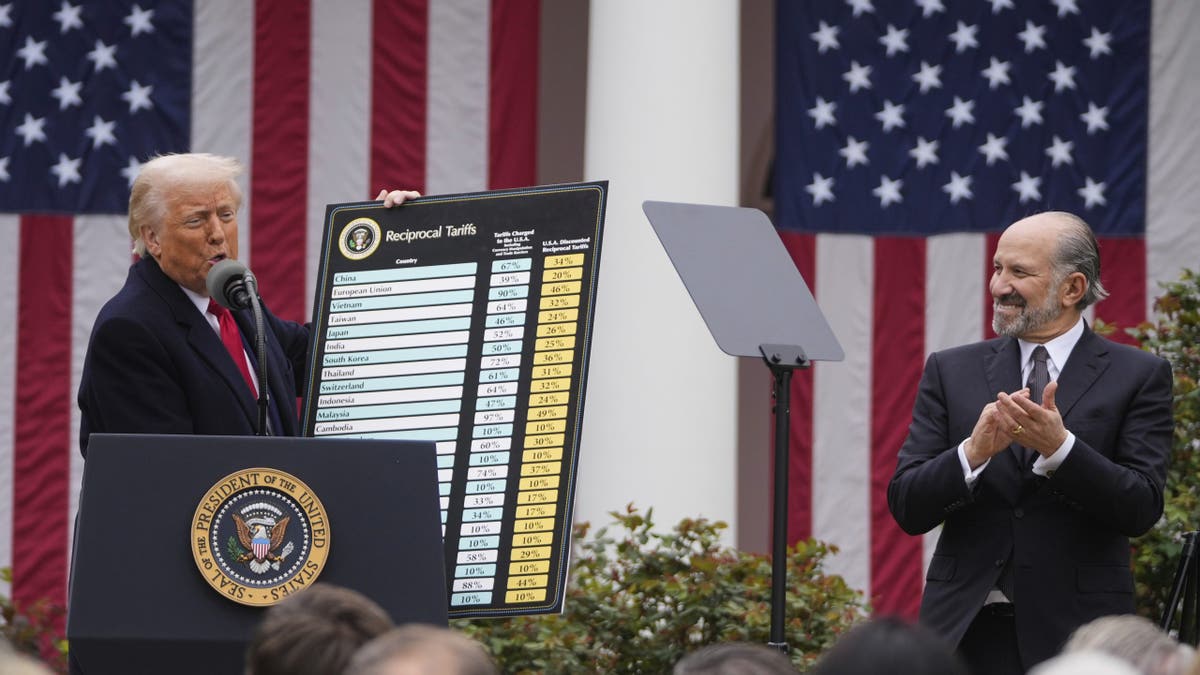INTERNACIONAL
Canada’s PM Carney vows to ‘fight’ Trump’s tariffs, other world leaders weigh impact
Canadian Prime Minister Mark Carney on Wednesday evening vowed to «fight» the new round of tariffs announced by President Donald Trump, and said he would turn to other international partners to get through the rocky times ahead.
«President Trump has just announced a series of measures that are going to fundamentally change the international trading system,» Carney told reporters following Trump’s Rose Garden announcement. We’re in a situation where there’s going to be an impact on the U.S. economy, which will build with time.
«In our judgment, it will be negative on the U.S. economy that will have an impact on us,» he added, noting millions of Canadians will be impacted.

Prime Minister Mark Carney holds a press conference following the First Ministers Meeting at the National War Museum on Friday, March 21, 2025. (Sean Kilpatrick/The Canadian Press)
WHICH COUNTRIES IMPOSE THE HIGHEST TARIFFS ON THE US?
While Trump did not issue any additional tariffs against Canada following the 25% tariffs already in place on all Canadian imports, the 10% tariff on its energy exports and the blanket tariff on all aluminum and steel, he did announce a 25% tariff on all foreign vehicle imports.
He also pointed out that Trump said there could be future targeted tariffs against pharmaceutical companies, lumber and semiconductors — tariffs that will have wide affect on U.S. trading partners beyond Canada and Mexico, but across Europe and Asia.
«In a crisis, it’s important to come together,» Carney said. «It’s essential to act with purpose and with force, and that’s what we will do.»
Before the tariff announcement, Canadian Conservative Leader Pierre Poilievre said at an election campaign event on Wednesday that he supports «targeted, reciprocal» tariffs on American goods — and if his party wins the general election on April 28 and he becomes prime minister, he would like to sit down with President Donald Trump and create a new trade deal, replacing the United States-Mexico-Canada Agreement, which the president signed in 2020.

Pierre Poilievre, leader of Canada’s Conservative Party, speaks at the Assembly of First Nations Annual General Assembly in Montreal, Quebec, Canada, on Thursday, July 11, 2024. (Graham Hughes/Bloomberg via Getty Images)
Poilievre also said that Canada must maintain control of its border and freshwater and protect both its automotive industry and supply-managed farm sectors.
David Adams, president and CEO of Global Automakers of Canada — a national trade association representing the Canadian interests of 16 automakers, including BMW Canada, Inc. and Nissan Canada Inc. — said in a statement, «Tariffs are taxes that hurt consumers by increasing costs, driving up inflation, and unfairly impacting workers on both sides of the border.»
«Governments should look to long-term solutions to remove these tariffs, prioritizing the elimination of regulatory barriers to industry competitiveness and providing automakers with flexibilities to respond in these uncertain times.»
Reactions from European Union leaders began to emerge following Trump’s announcement that he will hit the EU with 20% tariffs on all imported goods, with disappointment, concern and commitments to continue negotiations with the U.S.

US President Donald Trump holds a chart as he delivers remarks on reciprocal tariffs during an event in the Rose Garden entitled «Make America Wealthy Again» at the White House in Washington, DC, on April 2, 2025. (Getty Images)
CANADA STARES DOWN CONSEQUENCES OF TRUMP TARIFF WAR: JOB LOSSES, GROCERY PRICE HIKES, POSSIBLE RECESSION
Italian Prime Minister Giorgia Meloni, generally seen as a Trump ally, said Trump’s tariffs were «wrong» and warned they would not only harm American and European pocketbooks, but aid Western adversaries.
«We will do everything we can to work towards an agreement with the United States, with the goal of avoiding a trade war that would inevitably weaken the West in favor of other global players,» Meloni said in a statement on Facebook.
«In any case, as always, we will act in the interest of Italy and its economy, also engaging with other European partners,» she added.
Ireland’s Deputy Prime Minister, Simon Harris, said he «deeply regret[s]» the new tariffs but said he is committed to working with Washington to end this tariff war.
«I must be honest tonight that a 20% blanket tariff on goods from all EU countries could have a significant effect on Irish investment and the wider economy,» he said, noting the effects would «likely be felt for some time.»
Chairman of the European Parliament’s International Trade Committee Bernd Lange called for a united response from countries targeted by Trump.

President Donald Trump speaks during an event to announce new tariffs in the Rose Garden at the White House, Wednesday, April 2, 2025, in Washington, as Commerce Secretary Howard Lutnick listens. (AP Photo/Mark Schiefelbein)
«While President Trump might call today ‘Liberation Day,’ from an ordinary citizen’s point of view this is ‘Inflation Day,’ he said, reported Reuters. «Because of this decision, U.S. consumers will be forced to carry the heaviest burden in a trade war.»
Lange said the EU will respond through «legal, legitimate, proportionate and decisive» measures.
Swiss President Karin Keller-Sutter said her government would work to figure out the next steps.
CLICK HERE TO GET THE FOX NEWS APP
The U.K., along with the president of Mexico ahead of the announcement, said they would continue to work with the U.S. and would not rush to enforce reciprocal tariffs.
Similarly, Australian Prime Minister Anthony Albanese said that while Trump’s decision was «not the act of a friend,» his country would not impose reciprocal tariffs, reported Reuters.
He reportedly condemned the U.S. tariffs as totally unwarranted and said Australia will continue to negotiate to have the tariffs lifted.
INTERNACIONAL
Un incendio obligó a cerrar un centro de datos de Amazon en Emiratos Árabes Unidos en medio de los ataques iraníes

La unidad de computación en la nube de Amazon, AWS, suspendió este domingo las operaciones en uno de sus centros de datos en Emiratos Árabes Unidos después de que objetos no identificados impactaran la instalación, provocando chispas y un incendio que obligó a cortar el suministro eléctrico, según informó la compañía. El incidente ocurrió en medio de una ola de ataques iraníes con misiles y drones contra infraestructura civil y militar en toda la región del Golfo Pérsico.
Según AWS, los objetos impactaron alrededor de las 4:30 de la madrugada, hora del Pacífico. El departamento de bomberos local cortó la electricidad a la instalación y a los generadores mientras trabajaba para extinguir las llamas. La compañía indicó que esperaba autorización para restablecer el suministro eléctrico y que el restablecimiento de la conectividad en la zona afectada tomaría varias horas. Las demás zonas de disponibilidad en Emiratos operan con normalidad.
Cuando la agencia Reuters preguntó a AWS si el incidente estaba relacionado con los ataques iraníes en curso, la compañía no confirmó ni desmintió ninguna conexión. El Ministerio de Defensa de Emiratos reportó que desde el inicio de los ataques iraníes el pasado sábado, las fuerzas aéreas y de defensa antiaérea del país interceptaron y destruyeron 165 misiles balísticos, dos misiles de crucero y 541 drones. Sin embargo, 21 drones lograron impactar objetivos civiles, causando tres muertes de trabajadores migrantes de Pakistán, Nepal y Bangladés, además de 58 heridos.
Los ataques iraníes contra Emiratos forman parte de una represalia masiva tras operaciones conjuntas de Estados Unidos e Israel que resultaron en la muerte del líder supremo iraní, el ayatolá Ali Khamenei, el pasado sábado. Según medios estatales iraníes, los ataques estadounidenses e israelíes causaron al menos 201 muertes en 24 provincias iraníes, incluyendo 148 niñas en una escuela primaria en la ciudad sureña de Minab.
2026 Planet Labs PBC/Handout vía REUTERS
Las estructuras de AWS conocidas como zonas de disponibilidad están compuestas por uno o más centros de datos físicos interconectados dentro de una región geográfica. Estas zonas funcionan como ubicaciones aisladas diseñadas para garantizar la continuidad del servicio en caso de fallos. La región ME-CENTRAL-1, inaugurada en noviembre de 2022, representa la segunda infraestructura de AWS en Medio Oriente junto con la de Baréin.
El Cuerpo de la Guardia Revolucionaria Islámica de Irán anunció que sus ataques se dirigieron a 27 bases militares donde se despliegan soldados estadounidenses, la base aérea israelí de Tel Nof, el cuartel general del ejército israelí en HaKirya en Tel Aviv y un complejo industrial de defensa. La ofensiva iraní impactó también aeropuertos internacionales en Dubái, Abu Dabi y Kuwait, lo que provocó la suspensión de vuelos y el cierre de espacios aéreos en todo el Golfo Pérsico.
Las autoridades emiratíes activaron protocolos de emergencia en todo el país, emitiendo alertas de alta prioridad a través de teléfonos móviles que instruyeron a la población a buscar refugio inmediato en edificios seguros y mantenerse alejados de ventanas, puertas y áreas abiertas. El Ministerio de Educación ordenó la transición a educación a distancia para todas las escuelas públicas y privadas desde el 2 hasta el 4 de marzo.
La infraestructura de servicios en la nube ha adquirido una importancia estratégica crítica para economías como la de Emiratos, donde sectores financieros, energéticos y de telecomunicaciones dependen de centros de datos para operaciones esenciales. AWS opera miles de servidores en la región ME-CENTRAL-1 que proporcionan servicios a empresas gubernamentales, instituciones financieras y compañías de tecnología en todo Medio Oriente.
Los restos de misiles y drones interceptados cayeron en diversas áreas de Emiratos, causando daños materiales menores en propiedades civiles. En Palm Jumeirah, la isla artificial de Dubái famosa por sus hoteles de lujo, cuatro personas resultaron heridas cuando fragmentos de un misil impactaron un hotel de alta categoría, provocando un incendio. También se reportaron incendios en el puerto de Jebel Ali, uno de los más transitados de Medio Oriente, y en la fachada del icónico hotel Burj Al Arab.
El Ministerio de Defensa de Emiratos confirmó que de los 137 misiles balísticos detectados durante el ataque inicial del sábado, 132 fueron destruidos mientras cinco cayeron al mar. De los 209 drones rastreados, 195 fueron interceptados. Los sistemas de defensa aérea demostraron alta capacidad de respuesta, aunque algunos proyectiles lograron penetrar las defensas y causar daños colaterales.
La escalada regional ha generado disrupciones significativas en el transporte aéreo, con aerolíneas suspendiendo vuelos hacia y desde importantes centros de conexión en Medio Oriente. Mapas de tráfico aéreo mostraron espacios aéreos prácticamente vacíos sobre Irán, Irak, Kuwait, Israel y Baréin tras el inicio de los ataques. Emiratos, que se había posicionado como un refugio de estabilidad y seguridad en una región turbulenta, enfrenta ahora la fragilidad de esa percepción ante una confrontación militar de alcance regional.
North America
INTERNACIONAL
Trump’s Iran strike rocks Texas Senate race as Dems demand ‘war powers,’ GOP applauds president

NEWYou can now listen to Fox News articles!
SAN ANTONIO, TX – With hours to go until primary day in Texas, the U.S. and Israeli attack on Iran is the latest flashpoint in Lone Star State’s high-stakes and combustible Senate showdown.
Republican Sen. John Cornyn and his two primary challengers are rallying around President Donald Trump’s decision to launch the attacks, which are now in their second day and resulted in the killing of Iran’s supreme leader, Ayatollah Ali Khamenei. Three American military members were also killed in the fighting.
But the two Democrats vying for their party’s nomination in a bid to try and flip the long-held Republican seat in right-leaning Texas are condemning the airstrikes on Iran.
This year’s Senate showdown in Texas is one of a handful across the country that could determine if Republicans hold their majority in the chamber in the midterm elections. The GOP currently controls the chamber 53-47.
President Donald Trump announced strikes on Iran early Saturday, which eliminated Supreme Leader Ayatollah Ali Khamenei. (President Trump Via Truth Social/Anadolu via Getty Images)
«I think the President did the right thing. It’s amazing to me that President Trump is the only president in my lifetime that is willing to take this kind of decisive action in order to stop the halt of terrorism and also radical Islam,» Cornyn said Sunday in a Fox News Digital interview.
Cornyn praised the operation, saying «this was well planned and was very decisive.» But he added, «There’s still a lot more to be done, and unfortunately, Iran still has a lot of ability to inflict casualties on people in the region.»
The senator’s top primary rival, Texas Attorney General Ken Paxton, thanked Trump for his «courageous leadership.»
Paxton, a MAGA firebrand and longtime Trump supporter who has survived a slew of scandals over the past decade, said in a social media post that «President Trump’s Operation Epic Fury is yet another overwhelming and historic military success. Khamenei’s been killed and the terroristic regime threatening our troops and nation has been decimated.»
IRAN’S NEAR HALF CENTURY WAR ON AMERICANS
Rep. Wesley Hunt, the Army veteran turned MAGA rising star, also praised the president, saying, «Trump did it again. PEACE THROUGH AMERICAN STRENGTH!»
«Iran’s Ayatollah Ali Khamenei is DEAD, and now the people of Iran have a chance to be free,» added Hunt, a West Point graduate who flew Apache helicopters during his Army service who is in his second term representing a safe Republican district in the Houston-area.
Trump, whose clout over the GOP remains immense, has stayed neutral to date in the Republican primary. All three candidates, who have sought the president’s endorsement, were in attendance Friday as Trump held an event in Corpus Christi, Texas.

Trump has yet to make an endorsement in the closely-watched primary. (Mandel NGAN/AFP via Getty Images)
«They’re in a little race together,» Trump said of Cornyn and Paxton. «You know that, right? A little bit of a race. It’s going to be an interesting one, right? They’re both great people, too.»
Trump also complimented Hunt, and said that all three contenders were engaged in an «interesting election.»
DEMS’ POTENTIAL 2028 HOPEFULS COME OUT AGAINST US STRIKES ON IRAN
The two major Democrats in the race, progressive firebrand Rep. Jasmine Crockett and rising Democratic Party star state Rep. James Talarico, are chastising Trump for not seeking congressional approval.
«CONGRESS, not the PRESIDENT, but CONGRESS has the EXCLUSIVE authority to declare war! Speaker Johnson needs to call us in IMMEDIATELY & it is time for the House & the Senate to pass a war powers resolution!» Crockett wrote on social media this weekend.

The two Democrats in the race, Rep. Jasmine Crockett and state Rep. James Talarico, sound decisively different from their GOP counterparts with regard to the strikes. (Stringer/Getty Images)
And Crockett, a vocal Trump critic and foil, asked, «Why is it that this President refuses to even pretend that he cares about following the law?! I’ve been stomping & telling people that this election is life or death!»
Talarico, taking to social media this weekend, emphasized, «No more forever wars.»
But he didn’t make specific comments about the military strikes during a campaign event Sunday in San Antonio, Texas.
CLICK HERE TO DOWNLOAD THE FOX NEWS APP
Cornyn criticized the Democratic candidates for not supporting the U.S. operation.
«When the President has, in an act of political courage, ordered the U.S. military, along with our ally Israel, to defeat the number one state sponsor of terrorism and to prevent them from acquiring a nuclear weapon. Whose side do they choose? They choose the Iranian side. It’s just mind-boggling to me,» he argued.
And the senator predicted, «this will continue to be an issue in the midterm elections, because I don’t think that’s what the American people want, to live in a new world where a nuclear-armed terrorist state can literally terrorize not just the region but the world.»
donald trump,war with iran,iran,texas,senate elections,midterm elections,elections
INTERNACIONAL
Hormuz erupts: Attacks, GPS jamming, Houthi threats rock Strait amid US-Israeli strikes

NEWYou can now listen to Fox News articles!
The Strait of Hormuz region became a flashpoint Sunday after U.S.-Israeli strikes on Iran under Operation Epic Fury triggered electronic warfare activity and multiple «attacks» on vessels along one of the world’s most critical energy waterways, according to reports.
The sudden escalation followed a Feb. 28 warning from U.S. maritime authorities urging commercial vessels to avoid strategic waterways if possible, including the Persian Gulf, Gulf of Oman and Arabian Sea, citing heightened security risks.
«It is recommended that vessels keep clear of this area if possible,» the advisory warned.
«The Persian Gulf, Strait of Hormuz and adjacent waters are the most dangerous place right now for commercial shipping,» Jakob P. Larsen, head of maritime security at BIMCO, told Fox News Digital.
«Ships in the Persian Gulf are under threat from Iranian attacks,» Larsen said.
Navy vessel is seen sailing in the Strait of Hormuz, a vital waterway through which much of the world’s oil and gas passes, on March 1, 2026. (Sahar AL ATTAR / AFP via Getty Images)
«To protect themselves, most ships stay as far away from Iran as they can,» he added before describing how ships are «trying to depart from the Persian Gulf to get away from the threat.»
The United Kingdom Maritime Trade Operations (UKMTO) and regional authorities reported multiple maritime incidents listed as «attacks» Sunday.
One vessel west of Sharjah, UAE, was rocked by an explosion from an unknown projectile that detonated close alongside, and another tanker north of Muscat, Oman, was struck above the waterline, sparking a fire that was later brought under control, according to data.
A third vessel northwest of Mina Saqr, UAE, was also hit by a projectile that ignited a blaze aboard, the organization reported.
Compounding the physical threats is a surge in electronic warfare with maritime intelligence firm Windward reporting widespread GPS and Automatic Identification System (AIS) interference, impacting 1,000-plus ships.
IRAN FIRES MISSILES AT US BASES ACROSS MIDDLE EAST AFTER AMERICAN STRIKES ON NUCLEAR, IRGC SITES

A map showing the Strait of Hormuz and Iran. (Reuters)
Windward cited widespread navigation disruption near Iran’s Bandar Abbas port, with ships falsely appearing at airports, a nuclear power plant and inland locations.
Several new AIS jamming clusters were also identified across Emirati, Qatari, Omani and Iranian waters, Windward said.
Major shipping company Maersk announced it would reroute some services away from the region, citing crew and cargo safety.
Roughly 20% of global oil and gas exports pass through the Strait, and traffic has already thinned, with some tankers reversing course or switching off AIS signals.
Industry groups also warned of Houthi retaliation in the Red Sea and Gulf of Aden, while analysts cautioned that Iran could seize vessels tied to U.S. or Israeli interests.
«The Houthis have threatened to resume attacks on ships in the Red Sea, Bab el-Mandeb Strait and Gulf of Aden,» Larsen explained.
KEANE WARNS IRAN STRIKE BECOMING ‘REGIONAL WAR,’ SAYS THREE GULF STATES PREPARING FOR COMBAT

The Strait of Hormuz faces heightened security risks after U.S.-Israeli strikes triggered maritime incidents, prompting shipping companies to reroute vessels.
Ships with business connections to U.S. or Israeli interests are considered more likely targets, though others could be struck deliberately or in error, he said.
CLICK HERE TO DOWNLOAD THE FOX NEWS APP
Tanker owners’ association Intertanko also warned members that «the expectation is that the Houthis may respond and recommence attacks on shipping,» although immediate intelligence remained unclear.
«There are no signs of Iranian attempts to close the Strait with sea mines or naval mines, although this can change at short notice,» Larsen added before confirming that GPS interference has «increased significantly following the initiation of hostilities.»
war with iran,middle east,terrorism,us navy,conflicts,iran

 CHIMENTOS3 días ago
CHIMENTOS3 días ago¡Titi revolucionó Gran Hermano! Cuáles son las 5 cosas que ya extraña: «Accesorios, pilates, bondiola, auriculares y bailar»

 CHIMENTOS2 días ago
CHIMENTOS2 días agoEvangelina Anderson contó qué pasará con sus hijos ante el próximo desafío de Martín Demichelis en España

 CHIMENTOS3 días ago
CHIMENTOS3 días agoAndrea del Boca con un pie afuera de Gran Hermano: los escandalosos motivos















